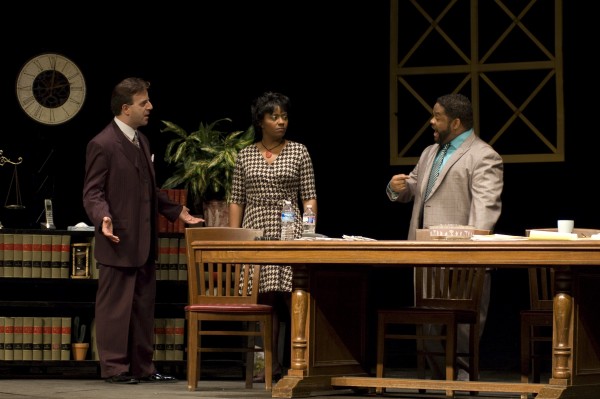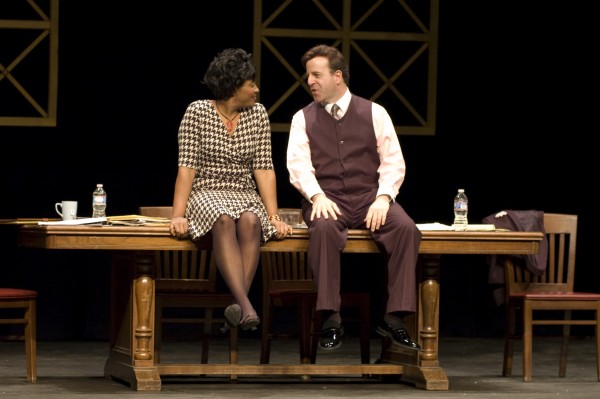
“Race” rages onto Weathervane Playhouse main stage
David Mamet’s play “Race” (currently running at Weathervane Playhouse, a Knight Arts grantee), is fraught with tension. That’s apparent before the story begins, for, while sitting waiting for the lights to come up, there is a clock ticking away – sometimes slowly and rhythmically, sometimes moving at presto staccato.
You get the idea that it could just as easily be a time bomb waiting to explode, as a kind of metaphor of what’s about to happen in this tale about two lawyers (one white, one black), who are kind of tricked, if you will, into defending a rich white man accused of raping a black woman. Toss in a new African-American female legal assistant with some sexual politics issues of her own and you’ll see the plot thicken.
No one in this play wants to tell the truth. If that does not undercut the ideal of the judicial system, the virtue of honesty, and the soundness of trial by jury, nothing will.
The two lawyers, Jack Lawson (played by Scott Shriner) and Henry Brown (played by Brian Armour), tend toward another view – forget the facts and find a way to win the case. Facts may lead to prejudices while biases may get in the way when it comes to everyday men and women on the panel. Make the truth seem reasonable. Create doubt. Be on your way with the money.
The lawyers start building a case on overlooked (maybe fabricated) evidence, only to have it undercut by the legal assistant who is certain the defendant is “absolutely” guilty as she says at the end of the play.
“Race” is a short play (some 75 minutes in one act) but seems longer. Mamet’s dialogue at times seems more like treatise writing than conversation. In short, it’s wordy. And that can be hard on actors. Sometimes the words seem to get in the way of them absorbing the dimensions of character and running with it.
l-r:Scott Shriner, Johnetta Harris, and Brian Armour in “Race.” Photo courtesy of Weathervane Playhouse
One has to give the Weathervane Playhouse actors credit, though, especially Brian Armour as the African-American lawyer. He brings across the tough assured personality of the character. Scott Shriner seems to get all the really long speeches, but he creates interest because they are the ones that call into question all our fundamental beliefs about the judicial system, fairness and truth.
Johnetta Harris, as the legal assistant Susan, gives her character coyness and a sense of freshness in this jaded world. They turn out to be masks for a kind of personal fury. You almost wish she would be angrier at the end of the play, but Harris gets the right edge because Susan has never seemingly had the luxury of speaking outright in the way she does.
Johnetta Harris and Scott Shriner in “Race.” Photo courtesy of Weathervane Playhouse
James Rizopulos, as Charles Strickland, the accused rapist, comes across as entitled by virtue of wealth, but oily in his ethics and messier in his morals. His character makes the mistake of writing down his sins, as Shriner’s Lawson directs, only to have the facts turned against him.
“Race” is uncomfortable in its subject matter (race, sex, shame, paranoia, contempt), strong in language and sexual imagery, and wordy in the telling, but it is also a riveting drama that makes you think, even when you’ve told yourself you’ve already thought all of that stuff through.
David Mamet’s “Race” will be performed at 7:30 p.m. on Thursday, 8 p.m. on Friday-Saturday, and 2:30 p.m. on Sunday through February 16 on the main stage at Weathervane Playhouse, 1301 Weathervane Lane, Akron; 330-836-2626; www.weathervaneplayhouse.com. Tickets are $21.
Recent Content
-
Artsarticle ·
-
Artsarticle ·
-
Artsarticle ·

